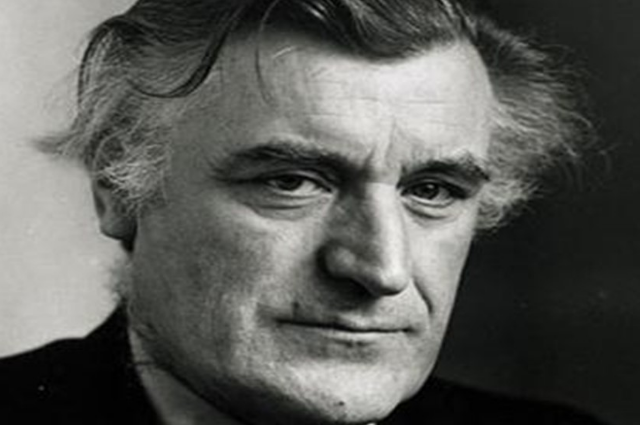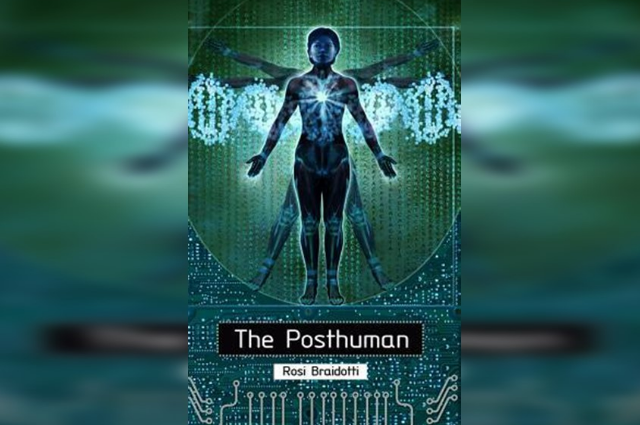Rosi Braidotti in her book, “The Posthuman” (2013) observes, ‘The environmental alternative is a new holistic approach that combines cosmology with anthropology and post-secular, mostly feminist spirituality, to assert the need for loving respect for diversity in both it's human and non-human forms’ (Braidotti, 48). And Ted Hughes’s presentation of Reverend Nicholas Lumb and his clone in his Gaudete, originally published in 1977 invokes a post-anthropocentric posthuman who wipes out the fear of boundary and invokes a posthuman world that diffuses the position of human beings at the centre by dissolving boundaries and limitations against interconnectedness in his attempt to heal the unknown female goddess.
Ted Hughes’s Gaudete (1977), a kind of a play with a prologue and an epilogue begins with Reverend Nicholas Lumb, an Anglican Clergyman and vicar of a sleepy modern English village. Nicholas Lumb, abducted by the spirits, is taken to the underworld in order to perform the healing of a sick female figure. The spirits create a duplicate of Nicholas Lumb to take his place in the ordinary world and perform his work in this real world. The duplicate and clone of Nicholas Lumb to be called Lumb 2 henceforth. Although the appearance of Lumb 2, the clone resembles the original Nicholas Lumb, the character and his role of a clergyman undergoes a complete reversal. Lumb 2 appears in the world as a fertility spirit, completely dominated by his sex drive. In an attempt to perform the dual role of the substitute vicar and that of a fertility spirit, Lumb 2 creates a new religion and forms a secret society with women where he preaches the doctrine of a new messiah to be born. Lumb 2’s adventurous mission as to the creation of a new individual, reflects the bankruptcy of the prevailing Christian religion and looks forward to the inception of a new religion that would grow along with nature and would contest with the arrogance and aggression of anthropocentrism. Mark Jackson in " Coloniality, Ontology, and the Question of the Posthuman" (2013), shakes off anthropocentric fervour by declaring, ' Human thought and agency is comprised of the agencies afforded through, for example, bees (food and thus energy), bacteria (digestion), affects ( sensibility and feeling), neurons (creative connections), geo-histories ( forces of production), silicone technologies ( speed and connection), shared ideas ( economics and connection), sunlight, and cosmological immanence " (Jackson, 8). Jackson's assertion reveals that human beings become parts of multiple things of the macrocosmic universe. In Hughes's Gaudete, Lumb 2 maintains a close relation with the agents of nature and challenges the notion of human supremacy. Lumb 2 places the human beings and all other human and non-human agents on an equal plane and establishes post-anthropocentric convictions. Lumb 2 attempts to dislocate the colonial atrocities of humans on nature by the creation of a new Messiah who will spread the predominance of nature.

Image by wikipedia.org
The setting in Ted Hughes’ Gaudete predicts major issues concerning the contemporary discourse of posthumanism. Ekbart Faas in The Unaccommodated Universe (1980) observes, ‘the landscape in which the drama takes place has a logical and consistent shape, and small details suggest that Hughes had a clear map of it in which to set the headlong narrative through which he wished to push his readers ( Faas, 214)’. The amalgamation of the sounds, the smells and the heat of animal bodies amplify the sheer abundance of plant and animal life in the Springtime landscape that occupy the same level of existence like that of human beings. The presentation of landscape in Gaudete with clear indication of its existence at the equal footing with other aspects of nature and the human beings, in particular dissolves the sense of anthropocentric outlook and ultimately unifies all species. The landscape along with the bio-genetic clone of Lumb 2 enters into a biopolitics that displaces anthropocentrism and at the same time recognises the significance of life beyond human species. The basic interventions of Lumb 2 with regard to the landscape in Gaudete and the interactions with the animals, the nonhumans and the human beings in it, establish a trans species solidarity as the basis of our being environmentally based, and that makes Lumb 2 a true embodiment of post anthropocentric posthumanism.
Lumb 2, the clone of the original Reverend Nicholas Lumb is an advanced representation of the recent trends of the products of bio-genetics. Lumb 2 invokes cultural dissemination by the transmission of the ideas, meanings and values of anti-anthropocentrism by extending and intensifying the social relations in conjunction with its relationship with the environment and earth science. Lumb 2, the clone, itself a product of biotechnologic imagination counters the responsibilities of the original Reverend Nicholas Lumb by its mission of forming a new cultural set up that blurs the boundaries between the human and the nonhuman, the human and the technological, and the human and the environmental by making its association with other human beings, other animals and the subhuman creatures and the environment. Lumb 2 wins over the original Reverend Nicholas Lumb who is an embodiment of anthropocentrism, entrusted with the task of healing a female goddess in the underworld. The sense of victory of the clone, Lumb 2 over anthropocentrism is expressed through his self assertion in "Gaudete" from Ted Hughes: Collected Poems :
A doctor extracted
From my blood its tusk
Excavated
The mountain-root from my body
Excised
The seven-seas’ spring from under my eye-tooth
Emptied my skull
Of clouds and stars
Pounded up what was left
Dried it and lit it and read by its flame
A story to his child
About a God
Who ripped his mother’s womb
And entered it, with a sword and a torch
To find a father.
(Hughes, lines 188-89)
Lumb 2 seeks to strike an alliance with the productive and immanent forces of life in its nonhuman aspects and this is evident from his assertion in "Gaudete" from Ted Hughes: Collected Poems where he forces his position on an equal level with that of the human beings and that too in combination with all other aspects of nature by declaring:
The throat of strong water in the neck of the pool
Is jabbering a babel, to which he listens.
Voices shut him in.
He sees up through a spiralling stair of voices
Into the sun’s blaze cupola.
He recognises voices out of his past. Peremptory trivial phrases,
Distinct and sudden, behind him and beside him.
One voice is coming clearer, insistent.
It calls his name repeatedly, searchingly.
It is his own voice.
As the other voices thicken over him
He manages, as from his deep listening, to answer: ‘I’m here.
(Hughes, line 77)
The adaptation of different cultures has made Lumb 2 an individual who partakes in extended social relations that cross the borders of human and the non-human. Cultural dissemination, involving the formation of shared norms and knowledge with which people associate their individual and collective cultural identities, provides the impetus for the creation and expansion of such relations and increases interconnectedness among different populations and cultures.
The Epilogue, which begins with a picture of the returned Lumb on the west coast of Ireland, becomes the most important tramp figure of Hughes. He returns as a wandering Jew or the Ancient Mariner or the fallen King Oedipus who are condemned henceforth or blessed to carry the burden of their experience on the fringes of society with the memories of failure that they encountered in the underworld. Lumb buried the memories of failure to heal the unnamed goddess and his experience with her. A remarkable change is noticeable in Lumb at his return from the underworld and a new Lumb re-emerges with different values, namely those of humility not violence, those of submission of the will, not of blind self-assertion. Lumb ultimately shares the fate of the woman goddess who have been victims of his cause. The failure to heal the unknown white goddess is a defeat of the anthropocentric Lumb who required a transformation into a post anthropocentric view in order to heal the unknown goddess who is an embodiment of feminist posthumanities.
By refusing to be healed the female goddess actually questions the autonomy of anthropocentric and androcentric humanism that separates the human from everything that is non-human. The extermination of the female goddess reaffirms Darwin's concept of natural selection as the female goddess refuses to accept submission to the hands of androcentrism as represented by Nicholas Lumb. Darwin observed, 'Though nature grants vast periods of time for the work of natural selection, she does not grant an indefinite period, for as all organic beings are striving, it may be said, to seize on each place in the economy of nature, if anyone species does not become modified and improved in a corresponding degree with its competitors, it will soon be exterminated' ( Darwin, 74-75). In Hughes's Gaudete, the female goddess is exterminated not by natural interference but the extermination occurs due to the infringement of her natural rights by the anthropocentric and androcentric interventions of Reverend Lumb.
Ted Hughes in Winter Pollen: Occasional Prose reveals his observation on nature's course of action. He asserts, ' Nature's obsession, after all, is to survive. As far as she is concerned, every new baby is a completely fresh start. If Westernized civilized man, the evolutionary error, is still open to correction, presumably she will correct him. If he is not open enough, she will still make the attempt' (Scammell, 135). The transformed and submissive Lumb at the end of the epilogue testifies to the function of the female goddess for bringing about remarkable positive changes in Hughes' Gaudete. The female goddess is the mother Earth, the earth goddess and the genesis of all other creations. Lumb's attempt to heal the female goddess and his subsequent failure to do so is finally preserved in the in- between- state of existence that remains as something beyond good and beyond evil. The question remains as to what extent is it life- advancing, life-preserving and species-preserving.
The representation of Lumb 2 along with Reverend Nicholas Lumb and the female goddess in Ted Hughes’s Gaudete invokes a biotechnological age that welcomes a metamorphosis of the present world with its reworking of the cloning of human life that seeks a post- anthropocentric outlook by enhancing relationship and diffusing the boundaries between human and the nonhuman, between human and other species, between the environment and the earth in an all-consuming commodification of life that work in tandem with post- anthropocentric posthumanism.
. . .
Reference:
- Braidotti, Rosi. The Posthuman. Polity Press. 2013.
- Darwin, Charles. The Origin of Species. General Press, 2017.
- Faas, E. ‘Appendix II’, The Unaccommodated Universe. Black Sparrow Press, 1980.
- Hughes, Ted and Paul Keegan."Gaudete." Ted Hughes: Collected Poems. Faber and Faber, 2003.
- Hughes, Ted, and William Scammell. "The Environment." Winter Pollen: Occasional Prose. Picador USA, 1995.
- Jackson, Mark. Coloniality, Ontology, and the Question of the Posthuman. Routledge, 2018.

